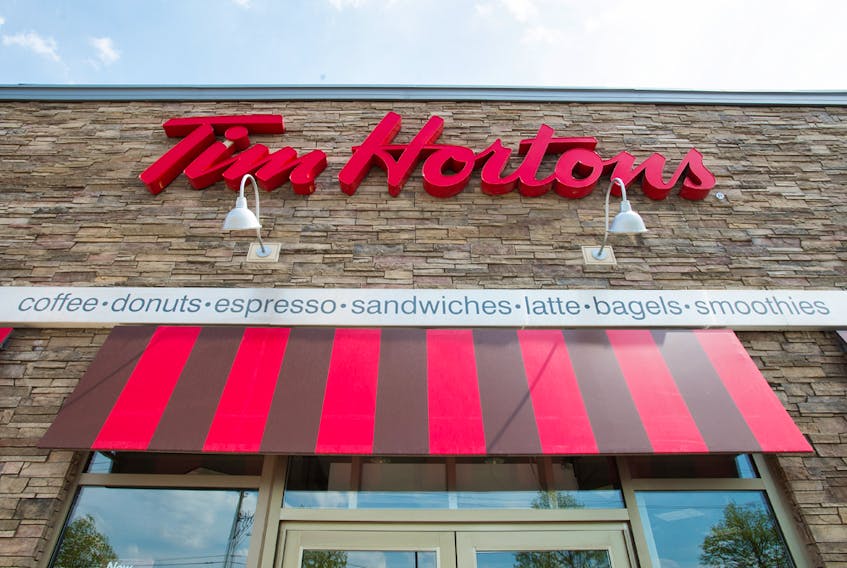Tim Hortons is facing a class-action lawsuit in Quebec over data collection issues in the company’s mobile ordering app, filed a day after four privacy watchdogs announced a joint investigation into the company’s overreach.
The court application filed by Montreal-based law firms LPC Advocat Inc. and Consumer Law Group on Tuesday, cites reporting by the Financial Post from earlier in June, which revealed the Tim Hortons app was logging users’ location in the background when the app wasn’t open. The app was streaming GPS location data to Radar Labs Inc., an American company which analyzes location data to infer where users live and work, and logs a person’s visits to one of Tim Hortons’ competitors, such as Starbucks Corp. or McDonald’s Corp.
Immediately after privacy commissioners for the federal government, Quebec, Alberta and British Columbia announced their joint investigation on Monday, Tim Hortons said in a statement that it has discontinued its practice of tracking users’ location when the app is not open.
“It certainly seems to be an implicit admission on their part that what they were doing was wrong,” said Joey Zukran, a consumer protection lawyer with LPC Advocat Inc., which specializes in class-action litigation.

Zukran said the lead plaintiff is a Montreal resident who works in the IT sector. He was a user of both the Tim Hortons and Burger King apps, and since both of those chains are owned by parent company Restaurant Brands International Inc., he was likely being tracked twice.
“I would say he’s a tech-savvy guy, from my conversations with him. He was a customer of Tim Hortons, a customer of Burger King. He uses the app often… learning everything that transpired came as a big shock to him,” Zukran said.
Zukran said that simply stopping the practice of background location tracking isn’t enough, because Tim Hortons’ parent company appears to have been tracking the lead plaintiff since last year, and the damage is already done.
“Let’s see what they do with the information. Are they going to destroy it? Are they going to use it?” he said. “They’ve gained a valuable database of information and behaviour patterns and activities of individuals. So are they now just going to throw that out, or are they going to profit from it? My guess is the latter.”
"Let’s see what they do with the information. Are they going to destroy it? Are they going to use it?" —Joey Zukran, consumer protection lawyer
Tim Hortons’ chief corporate officer Duncan Fulton said in an emailed statement the company did not have any comment on the class-action lawsuit, and reiterated that it had discontinued background location tracking, although the app may still record user location when it’s open.
“Since Tim Hortons launched our mobile app, our guests always had the choice of whether they share location data with us, including ‘always’ sharing location data — an option offered by many companies on their own apps,” Fulton said.
Ostensibly, the lawsuit is asking for a $100 penalty, but the key point, according to Consumer Law Group lawyer Jeff Orenstein, is that they are asking the court to award punitive damages.
In many cases of privacy violations, it’s difficult to sue because litigants can’t put a dollar figure on the harm they have suffered. But the Quebec Charter of Rights and Freedoms makes privacy a protected right, and that simplifies the case, according to Orenstein.
“A Quebec Charter violation gets you punitive damages where you can show that the interference was with your protected rights,” he said.
“The punitive damages is the more simplistic route, but for that, you really have to show that the defendants intended to interfere with your privacy rights — which is what we allege in this case.”
Orenstein said most privacy and data cases in Canada have been focused on breaches where companies allowed private information to be leaked or stolen by hackers.
But litigation around issues relating to data and privacy could become more common, depending on how the courts respond in this case and future cases.
“If the courts realize how important privacy is, and attribute major dollar figures to it, then yes, this litigation will continue,” Orenstein said. “And it will be brought to the attention of these companies which will have major business decisions to make in the future — whether it’s worth the risk… If the courts give a slap on the wrist or nothing at all, then you’re not going to see that many cases.”
Financial Post
Copyright Postmedia Network Inc., 2020









